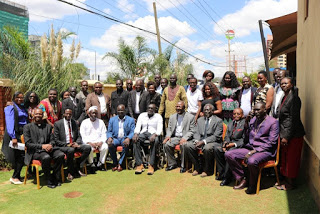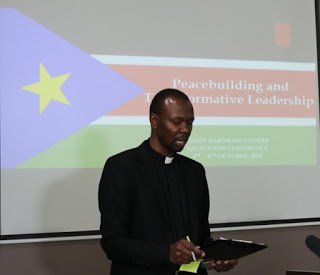KENYA: Jesuit Hakimani Centre to Venture Into South Sudan

Jesuit Hakimani Centre (JHC), a centre for social concern run by the Society of Jesus, the Jesuits in Eastern Africa, is set to begin programs in South Sudan. According to JHC Executive Director Rev. Fr. Oscar Momanyi, SJ, the institute plans to partner with other faith groups in South Sudan which are already running other programs for the communities.
Plans to venture into South Sudan are in advanced stages as the Centre already carried out a research to establish gaps and areas where they can do interventions. In April this year, JHC started the project entitled Advocacy for Transformative Leadership in South Sudan by conducting a research by using mixed methods such as interviews with key informants; Focus Group Discussions (FGDs) with the youth, women, religious leaders as well as the civil society organisations that work in South Sudan; and questionnaires which were administered in South Sudan and Nairobi. In total, the research had 377 respondents for the questionnaires, ten key Informant interviews and three focus group discussions.
The research was conducted in Juba, Wau, Rumbek, Torit, and Malakal in South Sudan and also in Nairobi among the South Sudanese people living in Kenya.
“The objective of the research was to get to know what are the gaps. Of course, a lot of things are being done on advocacy in South Sudan; so we wanted to identify the gaps in advocacy that Jesuit Hakimani Centre can contribute rather than replicate what others are already doing. Our intention is to supplement what others are already doing by collaborating with them,” Fr. Momanyi explained.

Sharing the Findings of the Research on Peace-Building and
Transformative Leadership in South Sudan during
the Validation Workshop held in Nairobi
According to the findings, majority of respondent cited that the country’s leadership is not committed to sustainable peace in South Sudan. The leaders are faulted for being self-centered and negligent to the needs of the citizens. At the same time, more than half of the respondents noted that religious leaders and faith based organizations have done well in facilitating change in South Sudan’s national political leadership.
The majority of South Sudanese however expressed their desire for sustainable peace in the country and their will to commit themselves to peace building.
“What was most glaring and surprising in is that when we asked about trauma healing and organisations working on it, we had zero percent: that was shocking. We had expected that there would be some people working in that area but it seems it’s almost non-existent,” Fr. Momanyi said.
They also found out that most organizations are working with women and girls.
“It is apparent that women voices have been hushed when it comes to leadership. We are therefore thinking about advocacy so that the voice of women is more pronounced in leadership. The other thing is that many people are taking about poor leadership and governance. Therefore, there is need to advocate for good leadership and governance. The Jesuit Hakimani Centre can partner with other people on the ground and do advocacy on the issue.”
So far JHC haven’t had any projects in South Sudan in advocacy hence they are trying to venture into South Sudan and do some high-level advocacy which will include people on grassroots level. However, the Jesuits in Eastern Africa have a number of projects in South Sudan which includes the Loyola Secondary School in Wau and the Jesuit Refugees Service JRS in Mabang’ Upper Nile.
The presence of Jesuit is much more pronounced in Rumbek Diocese where they run St. Theresa Parish, an agricultural school, a technical school and a teachers training college.
As part of preparations towards their mission in South Sudan, Jesuit Hakimani Centre held a three-day research findings workshop in Nairobi between 2-4 October with participants from South Sudan and Nairobi. The aim of the workshop was to validate the report and help JHC get more insight on areas they need to venture in, in terms of advocacy, as well as to find out who to partner with in the project.
“From this validation workshop we are going to Juba and spend some time there engaging with the people on the ground. We shall put together everything that we have collected and come up with concrete way forward so that next year we may start putting the project goals into activities,” Fr. Momanyi indicated.
JHC is guided by four principles that guide its work: to accompany, inform, serve and influence. The centre adopted the following five approaches and methods in its work: social research and publications; awareness raising; human capacity development support/trainings; advocacy and human development; and networking and partnerships.
∽End∽


